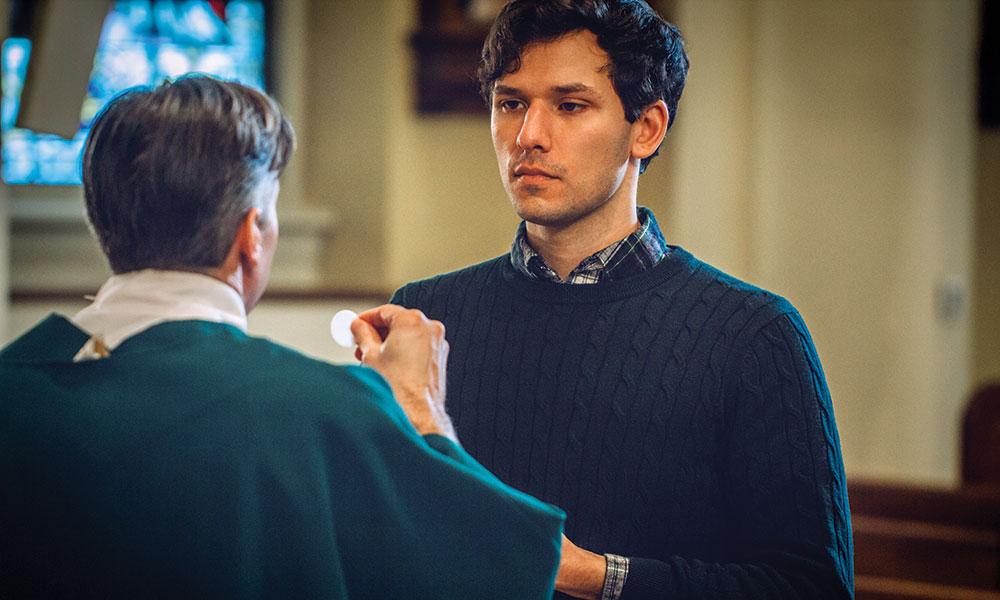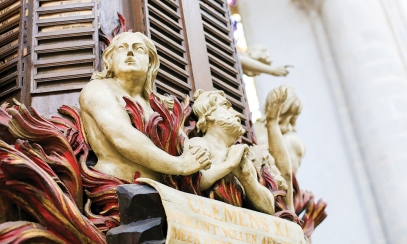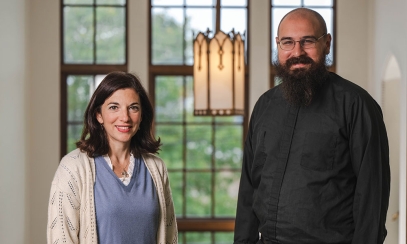
The Eucharist: Source and Summit of Catholic Social Teaching
Two years ago, Bishop Earl Boyea established a new diocesan Commission for Catholic Social Teaching. Its mission is to assist the bishop in his ministry to catechize all the baptized in the Diocese of Lansing on the principles of Catholic social teaching, advance the dignity of the human person and to promote the common good of society. It serves as a resource to the diocesan curia and parishes, and coordinates local and diocesan-wide efforts promoting Catholic social teaching. In this article, Michael Andrews, chancellor of the Diocese of Lansing and member of the Commission for Catholic Social Teaching, reflects upon the pivotal role of the Eucharist to Catholic social teaching. He writes:
Two years ago, Bishop Earl Boyea established a new diocesan Commission for Catholic Social Teaching. Its mission is to assist the bishop in his ministry to catechize all the baptized in the Diocese of Lansing on the principles of Catholic social teaching, advance the dignity of the human person and to promote the common good of society. It serves as a resource to the diocesan curia and parishes, and coordinates local and diocesan-wide efforts promoting Catholic social teaching. In this article, Michael Andrews, chancellor of the Diocese of Lansing and member of the Commission for Catholic Social Teaching, reflects upon the pivotal role of the Eucharist to Catholic social teaching. He writes:
One of the most powerful lines from the letters of St. Paul are the words he addressed to the Church in Galatia: “It is no longer I who live, but Christ who lives in me.” (Gal 2:20)
Paul recognized that his former life was one of self-justification, but that after his conversion, he found new life by faith in Christ who “loved me and gave himself for me.” Like the vine and the branches, the soul either bears fruit or withers depending on our union with Christ, trusting his word, and putting it into practice.
Sanctifying grace is sometimes described as “the life of God in the soul.” Baptism is the beginning of this new life; confirmation is its strengthening; it is deepened and given more and greater vitality in the holy Eucharist.
This communion of life with Jesus Christ and for one another is not some ideal or symbol but a true, real, and substantive participation in the life, death and resurrection of the Lord. As the Lord said, “He who eats my flesh and drinks my blood abides in me, and I in him.” (Jn 6:56) In holy Communion, we are made into his mystical body. Jesus says to us: “I am you and you are me.”
A soul in the state of grace lives in Christ, abides in him. This reality isn’t confined to the private, interior spiritual life. It extends to all aspects of everyday life: at home, at work, at play — in fact, wherever we are and whatever we’re doing. Jesus gives us life in its fullness. By partaking in the Eucharist, the Lord widens our hearts to experience his love.
A North African saint and bishop of the sixth century, Fulgentius of Ruspe, once reflected: “Since Christ died for us out of love, when we celebrate the memorial of his death, at the moment of sacrifice, we ask that love may be granted to us by the gift of the Holy Spirit.”
Today, many are confused about the meaning of love. The Greek language in which the New Testament was originally written offers us much-needed clarity. It identifies this specifically Christian kind of love as agape — a love grounded in and shaped by faith. It is a love purified from all selfishness. It emboldens self-denial and inspires sacrifice. It seeks the truest and deepest good of the other. It is the pattern of the Christian life and the fundamental criterion of all relationships: “Beloved, if God so loved us, we also must love one another.” (1 Jn 4:11)
Our faith, far from being a merely private concern, turns us outward, giving the faith an intrinsically social dimension. Our participation in the holy Eucharist, the sacrament of charity, calls us to manifest his presence in the world. The 19-20th century American religious St. Katharine Drexel, who dedicated her life to combat the effects of racism, wrote: “Ours is the spirit of the Eucharist, the total gift of self.” From the time of the apostles to today, believers have been challenged to grow in a greater love of neighbor, to defend the vulnerable, and to build a more harmonious and coherent society.
Catholic social teaching shows the path to lead this eucharistic way of life. It is not a political ideology, but a body of doctrine that has emerged from the Church's reflection on the social realities of our world. The Catechism of the Catholic Church underscores that it “proposes principles for reflection; it provides criteria for judgment; it gives guidelines for action.” (2423)
Its fundamental principles are universal, as Bishop Boyea explained in his 2012 Pastoral Letter Go and Announce the Gospel of the Lord, because they “seek the good of the human person, who is always being called by God to salvation. They do not speak only to Catholics, but to the world. Catholics have an obligation to speak of justice and peace to this world, as we seek to create a civilization of love.”
Four permanent principles are at the heart of Catholic social teaching. Its foundational principle is the dignity of the human person. In it, the entire content of the Church's social doctrine could be summarized.
Pope St. John Paul II observed that the person is a good toward which the only proper and adequate attitude is love. Each person, from the moment of conception to natural death, is a unique and unrepeatable being, called to eternal beatitude. Human dignity stems not from what an individual produces, does or consumes, but from one's fundamental worth as being made in the image of God. In practice, human dignity means that no human being is to be degraded or used as a mere means to an end. Regardless of how frail or unimportant as he or she may be regarded by some, the human person is always an image of God himself: “Amen, I say to you, whatever you did for the least of these, you did for me.” (Mt 25:40)
In Holy Communion, we are made into his mystical body. Jesus says to us: ‘I am you and you are me.’”
A consequence of human dignity, the principle of the common good consists in “the sum total of social conditions which allow people, either as groups or as individuals, to reach their fulfillment more fully and more easily.” (Vatican II, Gaudium et Spes, 26) The common good is the social and communal aspect of the moral good. It takes as its primary goal the flourishing of all people and of the whole person. The common good is not found only in socioeconomic well-being, but in the recognition that God is the ultimate end of his creatures. The social conditions that promote the common good are arduous, requiring constant effort, and the involvement of everyone in society. These include respect for the human person, peace, the virtue of justice, the integrity of creation, care for the marginalized and the alleviation of spiritual, cultural and material poverty.
The principle of subsidiarity protects the persons’ inalienable freedom. The word “subsidiarity” comes from the Latin subsidium (“help”) and refers to an attitude of support. In its original formulation, the principle holds that “a community of higher order should not interfere in the internal life of a community of a lower order, depriving the latter of its functions, but rather should support it in case of need and help to coordinate its activity with the activities of the rest of society, always with a view to the common good.” (Pius XI, Quadragesimo Anno, 78)
Finally, solidarity emphasizes interdependence and mutual responsibility between persons. It is the moral virtue which is a firm and persevering commitment to the good of all and of each individual. It seeks to love one’s neighbor with the same love with which the Lord loves him or her. Solidarity acknowledges the differences among people caused by various factors that enter into the plan of God. Indeed, God wills that each might receive what he or she needs from others and that those endowed with particular gifts and talents should share them with others. Such differences encourage and often oblige people to practice generosity, kindness, and the sharing of goods.
Blessed Pier Giorgio Frassati, a 20th century Italian layman whose life was cut short by polio at age 24, lived an abundant life in Christ. His deep spirituality was rooted in daily Mass, the rosary, eucharistic adoration and personal prayer. He invited his many friends to do likewise. Unafraid to take his faith into the public square, he sought the renewal of society according to the teaching of Christ and his Church. In notes he prepared for a speech, Blessed Pier Giorgio wrote: “The foundation of our religion is charity. Without it all our religion would crumble, because we would not really be Catholics as long as we did not shape our whole lives by the two commandments in which the essence of the Catholic faith lies: to love God with all our strength and to love our neighbor as ourselves.”



